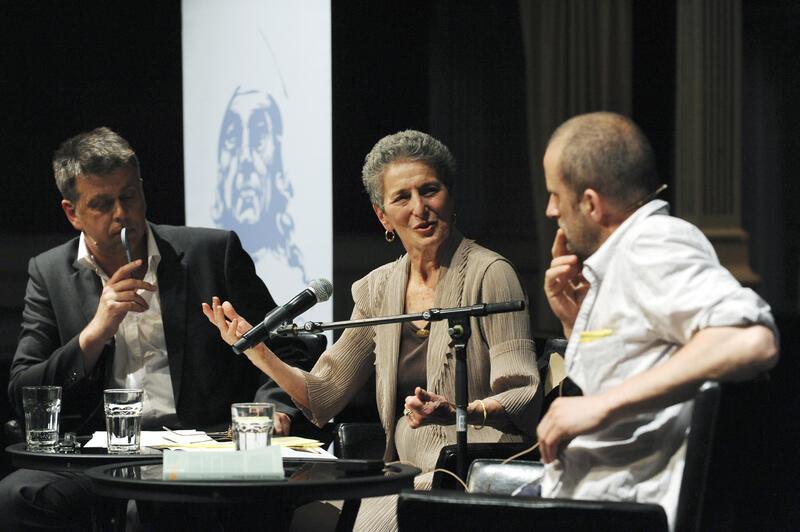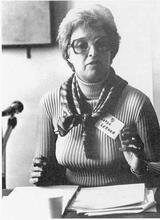Natalie Zemon Davis
Natalie Zemon Davis was a foremost historian of early modern Europe. Her first works focused on France, plumbing the archives for records that elucidate the lives of ordinary people, especially marginalized groups and women. She is best known for The Return of Martin Guerre (1983), a work that uncovered the case of a sixteenth-century imposter and was later made into a highly acclaimed film. Davis’s later scholarship focused on the daily interactions of Christians, Jews, and Muslims and on slaves and slaveholders, with a particular interest in their social encounters and cultural exchanges. She is known for traversing disciplinary boundaries and employing innovative research methodologies.
Natalie Zemon Davis was a leading historian of early modern Europe, a pioneer in feminist studies, and one of the first women to assume a senior position in academic life. In 1987, when she served as president of the American Historical Association, the largest professional organization of historians in the United States, she became only the second woman ever to hold that post. Davis’s work enriched historical understanding by challenging the boundaries of scholarly inquiry and broadening the scope of the historical profession.
Family and Education
Davis grew up in a middle-class Jewish family in Detroit, Michigan. She attended the Kingswood School for Girls, where she was one of only a few Jewish students. Her interest in history, as well as her leftist political allegiances, began to develop in high school and grew stronger in her college years. As a student at Smith College in the late 1940s, Davis participated in several political organizations, ranging from Marxist discussion groups to campaigns against racial discrimination. At the same time, as an honor student at Smith, she began to nurture her passion for historical research.
While still in college, Natalie Zemon married Chandler Davis, then a graduate student in mathematics. After completing college in 1949, she began her graduate studies at Harvard University, where she pursued social and cultural history and learned the fundamentals of archival research, earning a master’s degree from Radcliffe College in 1950. She continued her graduate work at the University of Michigan, while her husband accepted a position on the faculty; she received her Ph.D. in 1959.
Davis began her teaching career at Brown University (1959–1963) and has held faculty positions at the University of Toronto (1963–1971) and the University of California at Berkeley (1971–1977). She joined the faculty of Princeton University in 1978, where she was the Henry Charles Lea professor of history from 1981 until her retirement in 1996. Davis was the Northrop Frye Professor of Literary Theory at the University of Toronto in the fall of 1996 and has served there since as Adjunct Professor of History and Anthropology and Professor of Medieval Studies.
Political Activities
Natalie and Chandler Davis remained politically active, and both suffered the repercussions of the 1950s anticommunist backlash. Chandler Davis refused to sign the university’s required anticommunist oath, and in 1953 he was brought to testify before the House Un-American Activities Committee. His refusal to cooperate in the government witch-hunts resulted in his being dismissed from the faculty, blacklisted within the profession, and briefly imprisoned. Shortly before her husband’s firing, Davis had spent several months in France, a period she described as initiating her “lifelong love affair with the archives.” After returning from Europe, the government confiscated both the Davises’ passports, making it impossible for her to continue any research abroad. Forced by circumstance to revamp her research agenda, Davis turned her attention to rare book collections in the United States. Throughout her career, Davis continually broadened the intellectual scope of her work, examining the categories of class, gender, and religion, and employing the methodological tools of history, anthropology, and literature within her scholarly repertoire.
Scholarship
Davis’s early work explored the Protestant-dominated printing industry in sixteenth-century Lyon and set the stage for her investigation of the complex intersection of class, religion, and consciousness in early modern Europe. Her first book, Society and Culture in Early Modern France (1975), was a collection of essays covering a vast array of topics, including gender, social class, literacy, and religious culture in the early modern period. Many of her essays became classics in the study of gender and social history. Davis always displayed a remarkable ability to draw broad historical conclusions from the small details of daily life. In The Return of Martin Guerre (1983), she used sixteenth-century court records to craft a dramatic and revealing tale about Bertrande of Artigat and the impostor who posed as her husband, Martin Guerre. The book was widely read and the story was popularized in an acclaimed film, starring Gerard Depardieu and made with Davis’s contribution as historical consultant. In Fiction in the Archives: Pardon Tales and Their Tellers in Sixteenth-Century France (1987), Davis again brought archival sources to life, describing how common people accused of crimes explained their actions as they sought royal pardon. She demonstrated how individuals of different classes, gender, and social status constructed meaning, identity, and culture in a process she labeled “self-fashioning.”
Natalie Davis’s particular gift for weaving together life stories was on full display in her Women on the Margins: Three Seventeenth-Century Lives (1995), which explores the lives of Glückel of Hameln, Marie de l’Incarnation, and Maria Sibylla Merian. This study of three remarkable but hardly well-known women—one Jewish, one Catholic, and one Protestant—reveals their marginality while simultaneously painting a detailed and remarkable portrait of gender in early modern European society. In her examination of Glückel, the only Jewish woman among the three, Davis interprets Glückel’s complex roles as devout wife and mother and keen businesswoman.
In her next book, The Gift in Sixteenth-Century France (2000), Davis employed an anthropological approach to understand how gifting practices—ranging from charity to bribery to reciprocal obligations—shaped both alliances and conflicts in early modern business and family relationships, politics, religion, and more. Her 2006 monograph, Trickster Travels: A Sixteenth-Century Muslim between Worlds, returned to biography, tracing the complex life story of Leo Africanus (born al-Hasan ibn Muhammad al-Wazzan al Fasi), a Moroccan diplomat who was taken prisoner by pirates and baptized into Christianity by Pope Leo X. He famously authored the first early modern European geography of Africa and, according to Davis, lived a “double life” as a Muslim who operated in Christian culture. In these two recent works, Davis’s exploration of the sixteenth-century world provides crucial perspectives on the most pressing issues of contemporary life, whether shedding light on our consumerist world through the lens of early modern gift-giving or dissecting Muslim-Christian interactions in an earlier historical era.
Davis later worked on a monograph tentatively titled “Braided Histories,” focusing on Africans and Jews, Jews and Christians, slaves and slaveowners in Suriname. She chronicled this interplay of culture, race, and power through the historical figure of David Nassy, a seventeenth-century ex-converso from Brazil, and his family, who sought emancipation and legal rights while also becoming slaveholders. The corpus of Natalie Davis’s work demonstrates her intellectual range and breadth, her innovative style, her ability to interpret sources creatively, and her eagerness to transcend cultural and disciplinary boundaries.
Influencing the Profession
Davis always displayed a strong interest in the political and professional dimensions of the historical enterprise. As a young professor at the University of Toronto and the mother of three children, she pressed the university to make provisions for child care and recognize the needs of female employees and graduate students. At the University of Toronto and at Berkeley, Davis helped to create the first women’s history courses on campus. She played a leading role in creating women’s studies programs at both Berkeley and Princeton.
She was also vocal about the need for historians to conceive their work broadly, not as part of an enclosed professional discourse. In her 1987 presidential address to the American Historical Association, she advanced the notion of history as dialogue. “My image of history would have at least two bodies in it,” she explained, “at least two persons talking, arguing, always listening to the other as they gestured at their books.”
While Davis’s work did not centered primarily on Jewish issues, both Jewish culture and Jewish historical actors were a regular and often featured aspect of her scholarship. She declared her goal to “transform European history through the inclusion of Jewish history.” She also cited her Jewish background as a factor shaping her identity as a historian. She recalled that feelings of being an outsider in the majority culture prompted her curiosity about social construction and identity. As a Jew and a woman, Davis gravitated toward exposing and bringing to life the histories of those groups often suppressed in traditional historical narratives.
Davis received many honors for her work. She received the Holberg International Memorial Prize in 2010 and two years later was named Companion of the Order of Canada, the highest class within the order. She was awarded the 2012 National Humanities Medal, presented by President Barack Obama, for “her insights into the study of history and her exacting eloquence in bringing the past into focus.” In 2019, to mark her 90th birthday, Princeton University hosted a day-long workshop celebrating her scholarship and contributions to the historical profession.
Natalie Davis emerged as one of the foremost historians of her time. Her scholarship and intellectual creativity expanded the scope of historical inquiry, elicited new types of questions, and prodded the limits of research methodology. Her work enhanced the study of gender, class, culture, religion, art, and literature and helped to place all of those categories under the broad rubric of history. In addition to her many contributions to the historical profession, she wrote in an accessible style and addressed contemporary issues, giving her ideas a wide audience beyond the limited realm of historians.
Natalie Zemon Davis died on October 21, 2023.
Selected Honorary Degrees and Prizes
• Honorary Degree, The Hebrew University of Jerusalem 2000
• Toynbee Prize 2000
• Fellow of Early Modern Studies, Sixteenth Century Studies Conference 1998
• Honorary Degree, University of Edinburgh 1998
• Honorary Degree, University of Cambridge 1998
• Honorary Degree, Universität College 1998
• Smith College Medal 1996
• Honorary Degree, Harvard University 1996
• Corresponding Fellow, The British Academy 1995
• Eugene Asher Distinguished Teaching Award, American Historical Association 1994
• MA by special resolution of Congregation, University of Oxford 1994
• Honorary Degree, Dartmouth College 1994
• Honorary Degree, University of Massachusetts at Lowell 1994
• Honorary Degree, University of Pennsylvania 1992
• Honorary Degree, University of Chicago 1992
• Honorary Degree, University of Toronto 1991
• Honorary Degree, Columbia University 1990
• Honorary Degree, Colby College 1990
• Honorary Degree, Goucher College 1989
• Honorary Degree, New School for Social Research 1989
• Honorary Degree, Muhlenberg College 1989
• Honorary Degree, Reed College 1988
• Honorary Degree, Tufts University 1987
• Honorary Degree, George Washington University 1987
• Honorary Degree, Williams College 1987
• Honorary Degree, The University of Rochester 1986
• Honorary Degree, Lawrence University 1984
• Honorary Degree, Wesleyan University 1984
• Honorary Degree, Universite de Lyon II 1983
• Radcliffe Graduate Society Medal for Distinguished Achievement 1983
• Howard T. Berhman Award for Distinguished Achievement in the Humanities at Princeton 1983
• Honorary Degree, Northwestern University 1983
• Fellow, American Academy of Arts and Sciences 1979
• Honorary Degree, Smith College 1977
• Chevalier, l'Ordre des Palmes Académiques 1976
SELECTED WORKS BY NATALIE ZEMON DAVIS
Society and Culture in Early Modern France: Eight Essays. Stanford, CA: Stanford University Press, 1975.
Le retour de Martin Guerre, Laffont (Paris, France), 1982, translated and published as The Return of Martin Guerre. Cambridge: Harvard University Press, , 1983.
(Translator) Frauen und Gesellschaft am Beginn der Neuzeit. Berlin: Wagenbach, 1986.
Fiction in the Archives: Pardon Tales and Their Tellers in Sixteenth-Century France. Stanford, CA: Stanford University Press, 1987.
(Editor, with Arlette Farge) A History of Women, Volume 3: Renaissance and Enlightenment Paradoxes. Cambridge: Harvard University Press, 1993.
Women on the Margins: Three Seventeenth-Century Lives. Cambridge: Harvard University Press, 1995.
(Translator) Lebensgänge. Berlin: Wagenbach, 1998.
Slaves on Screen: Film and Historical Vision. Cambridge: Harvard University Press, 2000.
The Gift in Sixteenth-Century France. Madison, WI: University of Wisconsin Press, 2000.
L'histoire tout feu tout flamme. Paris: Albin Michel, 2004.
Trickster Travels: A Sixteenth-Century Muslim between Worlds. New York: Hill and Wang, 2006.
Creager, Angela N. H and Trivellato, Francesca, eds. “Natalie Zemon Davis: A Celebration of Her 90th Birthday” H-France Salon. volume 11, issue 15 (2019). Accessed July 2, 2020. https://h-france.net/h-france-salon-volume-11-2019/#1115.
Davis, Natalie Zemon and Denis Crouzet. A Passion for History: Natalie Zemon Davis, Conversations with Denis Crouzet (Early Modern Studies, 4), ed. Michael Wolfe. Kirksville, MO: Truman State University Press, 2010.
Diefendorf, Barbara B., and Carla Hesse, eds. Culture and Identity in Early Modern Europe (1500–1800): Essays in Honor of Natalie Zemon Davis. Ann Arbor, MI: University of Michigan Press, 1993.
Natalie Zemon Davis, National Humanities Medal, 2012. Accessed July 2, 2020. https://www.neh.gov/about/awards/national-humanities-medals/natalie-zemon-davis
“Natalie Zemon Davis.” In Visions of History: Interviews with E.P. Thompson ... by Marho, edited by Henry Abelov et al. Manchester: Manchester University Press, 1983.
Le Retour de Martin Guerre [The Return of Martin Guerre]. Daniel Vigne, director. Société française de production cinématographique, producer. Paris, May 1982. New York, June 1983.
Peters, Diane. “Becoming Natalie Davis.” University Affairs. November 5. 2014. Accessed June 25, 2020. https://www.universityaffairs.ca/features/feature-article/becoming-natalie-davis/







